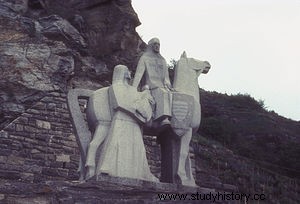Legend has it that when Leopold of Austria took Richard the Lionheart prisoner on his way back from the Crusades, he handed him over to Henry VI, Holy Roman Emperor, who locked up in a castle in Germany, the location of which was kept secret. A troubadour named Blondel de Nesle whom Ricardo, who had also made his first steps as a troubadour, had raised as a child, set out to tour Germany from castle to castle singing a couplet whose words he and Ricardo had composed. After a long, dangerous and tiring journey throughout the Holy Empire one day, when he arrived at a castle, a voice came from the dungeon of the same that continued with the lyrics of the song that he had started. He thus knew that he had found the King of England and was able to set in motion the mechanism for his release. The fidelity of the troubadour friend and the memory of the song that the two had composed achieved what no one else had achieved:locating the captive king of England in a lost and secret castle in Germany.
As the title of the post says, this story is very beautiful, but unfortunately it is not true. It comes from a story of the Minister of Reims of the thirteenth century, but as I say it does not fit reality. The truth is that Emperor Henry VI at no time kept the captivity or location of Richard the Lionheart a secret. He communicated it both to the king's mother, in order to claim a large ransom for him, and to the greatest enemy of the English king, Philip Augustus of France.
Some authors, such as R.R Bezzola and Régine Perroud point to the possibility that the Blondel legend contains a historical background, but as one of the main biographers of Richard the Lionheart argues , the French Jean Flori, is rather an attempt to recover for the benefit of the minstrels and troubadours a part of the prestige that Ricardo had earned in the years after his death. Ricardo's captors, Flori continues, «do not hide at all the" feat "of him; they even publish it in style, so that no one ignores it.”
When I was researching for my book The Plantagenets, Forthcoming publication, I had the opportunity to check the account that various British authors made of the captivity and rescue of Richard the Lionheart. Of all of them (cited below among the sources of this entry) none even mentioned the figure of Blondel, except for Dan Jones, who did so precisely to deny the story as a creation after the fact.
The very account that I make of this episode in Ricardo's life in my book (and from which I extract a paragraph below) leads me to the same conclusion, since hardly a king that he was held captive in an unknown and secret whereabouts could maneuver in the way that Richard did to undermine his brother Juan sin Tierra's attempt to seize the crown of England.
« Despite being imprisoned, Ricardo was able to maneuver to straighten things out in his country and have Hubert Walter, his companion in the adventure in Holy Land. Walter was able to counteract John's maneuvers to seize the crown (he returned to the country with a group of Flemish mercenaries, began to spread the rumor that Richard was dead, and went to London, where his request that the kingdom be handed over to him was denied) and with the invaluable help of Eleanor of Aquitaine he managed to squeeze nobles, merchants, clergy and the English people in general until he obtained the amount of the ransom required by Henry VI to return Ricardo's freedom. The liberation took place on February 4, 1194, against the payment of one hundred thousand marks and the promise of another fifty thousand, in guarantee of which various hostages were delivered to the emperor.»
In short, as beautiful as the legend of the troubadour Blondel de Nesle is, the story did not unfold that way.

This does not mean that in Durnstein Castle in Germany a statue represents Richard the Lionheart and Blondel de Nesle or so that their story has served as inspiration for operas such as Richard the Lionheart, by Modeste Grétry (1784), poems such as Coeur de Lyon by Eleanor Pondel (1822) or novels like the one by the prolific and interesting writer Gore Vidal (author of books like Julian the Apostate , Creation, Empire or Lincoln), that in his work In Search of the King recreates the legend of Blondel de Nesle. An author and a novel that I highly recommend for those who don't know them.
I decided to write this entry when I recently heard on a radio program a narration of the reign of Richard the Lionheart in which the story of Blondel was given as true, between a list of surprising historical inaccuracies about Ricardo and Juan sin Tierra that seemed hardly justifiable to me (unless it had initially been warned that the story was fictitious, which I did not hear)... but that is another story, about which if I dare I will write some day.
Image| Wikimedia Commons
Dan Jones. Plantagenets, The Kings Who Made England . London:William Collins Ed.; 2012.
Peter Ackroyd. A History of England. Volume I (Foundations) . London:McMillan Ed.; 2011.
Roy Strong. The Story of Britain . London:Pimlico Ed.; 1998.
Simon Schama. A History of Britain . London:BBC Worldwide Limited; 2000.
Derek Wilson. The Plantagenets, The Kings That Made Britain . e-book edition. London:Quercus Edition Ltd.; 2014.
Marc Morris. King John:Treachery, Tyranny and the Road to Magna Carta . Cornerstone Digital, ebook edition; 2015.
